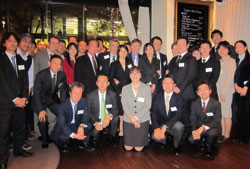U.S. Nominates Sean Murphy to Distinguished U.N. Commission
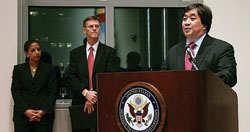 Courtesy U.S. State Department
Courtesy U.S. State Department
Professor Sean Murphy was nominated on Nov. 18 by the U.S. government to stand election in 2011 to the International Law Commission. Created by the United Nations in 1948, the ILC consists of 34 distinguished legal scholars, practitioners, and government officials elected by the U.N. General Assembly.
The nomination was formally conveyed to the U.N. by U.S. Ambassador to the United Nations Susan Rice. The U.S. government's intention to nominate Professor Murphy was first announced in October by U.S. Department of State Legal Adviser Harold Koh at a reception held at the U.S. Mission to the United Nations in New York.
"Sean Murphy has distinguished himself as one of the nation's greatest experts in international law through his teaching, scholarship, and practice before international tribunals," said Gregory Maggs, interim dean of GW Law School. "The U.S. government has recognized his skill in nominating him for election in 2011. The Law School is pleased and honored by this news."
Members elected in the fall of 2011 to the commission will serve five-year terms commencing in January 2012.
"I'm absolutely thrilled at the possibility of serving on the ILC," Professor Murphy said. "For someone who has spent his entire professional life studying and practicing international law, the opportunity to serve in this capacity is irresistible."
Professor Murphy is the Patricia Roberts Harris Research Professor of Law at GW Law School. Before joining the Law School faculty in 1998, Professor Murphy served as the legal counselor of the U.S. Embassy in The Hague, arguing several cases before the International Court of Justice and representing the U.S. government in matters before the International Criminal Tribunal for the former Yugoslavia, the Permanent Court of Arbitration, and The Hague Conference on Private International Law. He also served as U.S. agent to the Iran-U.S. Claims Tribunal, arguing cases on behalf of the U.S. government and providing advice to U.S. nationals appearing before that tribunal.
Between 1987 and 1995, he served in the U.S. Department of State Office of the Legal Adviser, primarily advising on matters relating to international environmental law, international claims and politico–military affairs. Professor Murphy has published numerous books, casebooks and articles on various aspects of international law and U.S. foreign relations law, including a general treatise on principles of international law.
The ILC promotes and prepares progressive development of international law and its codification, and prepares draft conventions on subjects that have not yet been regulated by international law or in regard to which the law has not yet been sufficiently developed in the practice of state.
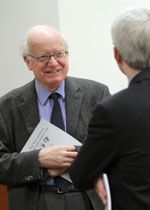 Abdul El-Tayef/WPPI
Abdul El-Tayef/WPPI
DiZerega Lecture
University of Florence (Italy) Professor Giorgio Gaja, member of the United Nations International Law Commission, speaks with Senior Associate Dean for Academic Affairs Edward T. Swaine after the 2010 Susan N. and Augustus diZerega Jr. Lecture on Nov. 12. Professor Gaja's remarks were titled, "The Uncertain Fate of Impermissible Reservations to Treaties."
Alumni Reception in Tokyo
Associate Dean Susan Karamanian, Professor Martin Adelman, and Professor and Chief Judge of the U.S. Court of Appeals for the Federal Circuit Randall R. Rader, JD '78, joined about two dozen alumni for a reception in Tokyo, in late November.
State Department Fellowship Brings Student to GW Law
GW is hosting a new international student on campus as part of the U.S. Department of State's Edmund S. Muskie Graduate Fellowship Program. Ruslan Mirzayev joins GW Law from Azerbaijan. His area of expertise is foreign investment and has previously taught at Baku State University and has worked in the Ministry of Taxes.
Established by the U.S. Congress in 1992 to encourage economic and democratic growth in Eurasia, the Edmund S. Muskie Graduate Fellowship Program is under the jurisdiction of the Bureau of Educational and Cultural Affairs (ECA) of the U.S. Department of State, and administered by international nonprofit IREX. By selecting emerging leaders from 12 countries of the former Soviet Union, the Muskie program aims to promote mutual understanding, build democracy, and foster the transition to market economies in Eurasia through intensive academic study and professional training. In addition to their academic programs, Muskie fellows participate in community service and develop professional skills through a full-time internship in their field of study.
State Department Holds Public International Law Advisory Committee Meeting at GW Law
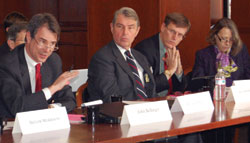 Claire Duggan
Claire Duggan
Former State Department Legal Advisers John Bellinger and Davis Robinson were part of the discussion, along with GW Law Professor Sean Murphy and Columbia Law Professor Lori Damrosch. GW Law Professor Michael Matheson, a committee member, and Professor Dinah L. Shelton and Associate Dean Edward T. Swaine were also in attendance.
Faculty and students were invited to attend the meeting. GW Law has hosted these State Department meetings several times over the last few years.
United States Department of State Legal Adviser Harold Koh (right) leads a meeting of the Public International Law Advisory Committee hosted at GW Law on Dec. 9 that included discussions with (l-r) former Legal Advisers Edwin D. Williamson and Herbert J. Hansell, and Sara Cleveland, State Department counselor on international law.
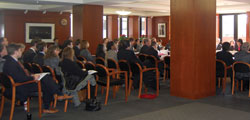 Claire Duggan
Claire Duggan |
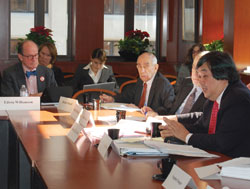 Claire Duggan
Claire Duggan |
GW Law's Next-Door Neighbor: the World Bank
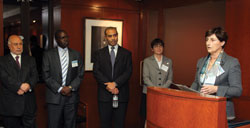
Abdul El-Tayef
World Bank Group Senior Vice President and General Counsel Anne-Marie LeRoy (right) gives remarks at a World Bank reception for general counsels co-hosted by GW Law and Associate Dean Susan Karamanian in November. At the event—also attended by Ian Hoddy Solomon, executive director for the United States at the World Bank (middle)—a memo of understanding between GW Law and the World Bank was announced that creates internship and job opportunities for graduates.
Professor Cottrol Brings Argentine Legal Experts to Campus
Professor Robert Cottrol hosted several lecture events this fall featuring two professors from Universidad del Salvador (Buenos Aires, Argentina) to speak about legal issues in Argentina. Professor Juan Frontera spoke on Indian rights focusing on the Rio de Plata region and the formation of Argentine federalism and powers. His colleague, Professor Carlos Safadi Marquez, spoke to students and faculty on the Argentine electoral system and how federalism is working today in the Argentine republic.
Experts Discuss the ICJ Advisory Opinion in Kosovo Independence Case
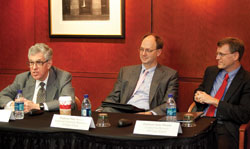
Nick Gingold
The GW International and Comparative Law Program—together with the United Nations Association and the American Society of International Law—hosted a panel discussion in November titled, "The International Court of Justice Advisory Opinion on Kosovo Declaration of Independence." The expert panel featured (l-r): former senior State Department official and GW Law Visiting Scholar Ron Bettauer, American University Law School Professor Paul Williams, and GW Law Professor Sean Murphy, counsel for the state of Kosovo in this case.
"Corporate and Human Rights Accountability in an Interdependent World"
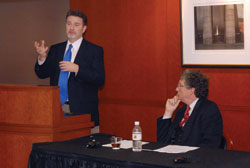
Claire Duggan
Corporate social responsibility and sustainable development expert Joe W. "Chip" Pitts III gave a lecture in October on the importance of business and industry implementing good human rights practices. Long-time colleague and friend Professor Ralph Steinhardt—both teach at the GW Law/Oxford Human Rights summer program—presided over the discussion. Pitts, the former chief legal officer of Nokia, Inc., and former chair of Amnesty International USA, is a professorial lecturer in law at Stanford Law School and an investor, founding executive, and consultant to start-up businesses.
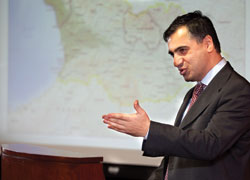
Nick Gingold
Georgia and Russia Before the ICJ
On Oct. 8, the International and Comparative Law Colloquium hosted the talk, "Georgia and Russia Before the International Court of Justice," with McGill University Professor Payam Akhavan.



